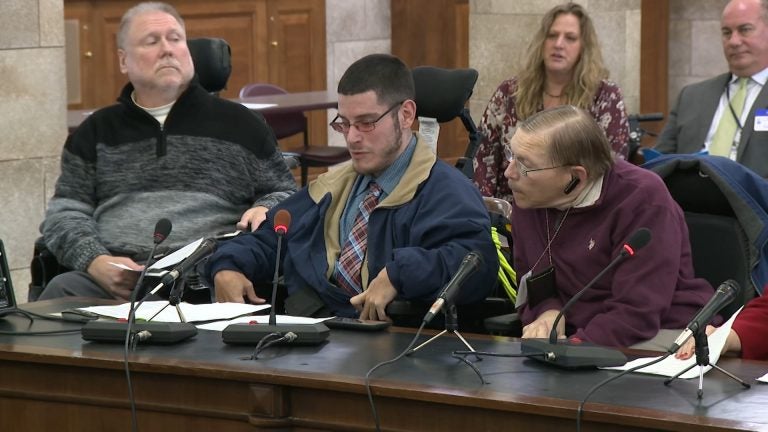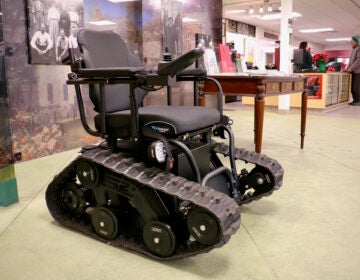Sweeney’s N.J. Transit Panel Fields Complaints from Riders with Disabilities
Witnesses share stories about how NJ Transit services for people with physical and developmental challenges are reliably unreliable

Steve Gruzlovic (center) of the Statewide Independent Living Council testified Thursday. (NJTV News)
This article originally appeared on NJ Spotlight.
–
The difficulties riders with disabilities face when using NJ Transit’s trains and buses was the focus Thursday of the third in a series of legislative hearings on the continuing deficiencies of the state’s mass transportation system.
“When we fix NJ Transit, it’s not just for the bus riders and the train riders,” said state Senate President Steve Sweeney who empaneled the select committee to conduct the review and serves as its chair. “It’s for the people that are disabled too, because you haven’t heard about these people. When you hear the outcries of NJ Transit, these are the voices you really don’t hear.”
Among those who testified at the hearing in Trenton was Steve Gruzlovic, who chairs the transportation committee of the Statewide Independent Living Council.
“My wheelchair is worth approximately $60,000 and if it’s out in the rain it could get destroyed,” he said. “A lot of the bus stops in the area are out in the open with no protection from wind, cold, rain, excessive heat and it could destroy my chair.”
The transit agency’s performance has been the focus of much criticism, both from the riding public and lawmakers, with trains and buses that run late or are canceled, at times for lack of operators.
In his State of the State speech this week, Gov. Phil Murphy touted progress that’s been made during his two years as chief executive, while noting that more work needs to be done.
“But, let’s be clear, the series of reforms we are undertaking to change NJ Transit’s fundamental operations, and the hundreds of millions of dollars in state budget investments we have restored, are unquestionably improving things — data clearly shows that cancellations are down and on-time performance is up,” he said.
Committee focuses on recent pace of progress
Sweeney called the committee together in the fall, days after the New York Times identified an NJ Transit train as the worst-performing commuter train in the country. The focus, he said, would be the slow pace of the agency’s recovery, and, as with Thursday’s session, previous hearings have detailed the problems that continue to leave riders frustrated.
During his testimony, Gruzlovic added his voice to that chorus.
“The drivers on NJ Transit buses, they don’t often know how to strap chairs incorrectly,” he said. “I, oftentimes, have to get into arguments about how to strap my chair down safely and it doesn’t make me feel confident or comfortable that I’m going to have a safe ride.”
Witness after witness Thursday shared stories about how NJ Transit services intended to help people with physical and developmental challenges are reliably unreliable.
Audrey Winkler runs Jespy House, which helps clients with developmental challenges become part of the workforce. She talked about the agency’s Access Link, designed to help those with special needs get to and from work, or doctor’s offices and hospitals.
The problem is that it frequently doesn’t link many customers to access, she said, noting that the vans provided by the agency are often not available at the times they are needed.
“If your shift starts at 9 a.m., which many of our jobs do, the only available pickup is 6 a.m. or 10 a.m.,” she said. “So either the clients have to go early and wait somewhere for two hours until the office opens or they can’t take that job.”
The failure has a significant impact on Jespy House’s clients, she said.
“The vans arrive in many cases before the clients’ shift ends, causing the clients to feel as if they’re being rushed to leave work early,” Winkler said. “These situations all reflect on the type of employee you can be for a particular employer.”
Recommendations for improvements
Advocates recommended forming a Regional Transportation Coordination Agency to get private and public providers to work better together, and a relaxing of rules that limit the area served by Access Link. They called them small fixes that could go a long way to making access real for many commuters with disabilities.
When Sweeney created the committee — whose members include Majority Leader Loretta Weinberg and Minority Leader Tom Kean — he said its focus would be the continuation of NJ Transit’s lagging performance under Murphy, a fellow Democrat with whom he has frequently sparred. He said he didn’t blame the governor for the transit system’s deterioration, just the slow pace of its promised recovery.
“It’s been two years and there’s no improvement,” Sweeney said at the time. “I don’t think there’s been any improvement. I don’t think you can point to anything and say, ‘We’re better now than we were two years ago … since this new administration’s come in.’ The time of blaming others has to be over, at this point.”
At the time, the Governor’s Office released a statement stressing the Legislature’s role in striking past budgets that cut NJ Transit’s state funding under Murphy’s Republican predecessor, Chris Christie.
“We welcome the Legislature’s scrutiny and look forward to the discussion of their budgets that were negotiated with Gov. Christie and sent to his desk, which reduced state funding to the agency by as much as 90%,” the statement read.
In his address to the Legislature this week, Murphy struck a conciliatory tone.
“I look forward to our continued partnership to fix NJ Transit,” he said. “At the end of the day, we still must answer to the commuter whose train was canceled, or whose bus is overcapacity. And, I won’t be happy until we bat 1.000.”
WHYY is your source for fact-based, in-depth journalism and information. As a nonprofit organization, we rely on financial support from readers like you. Please give today.




